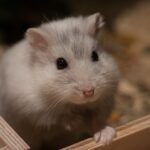Can Hamsters Eat Potatoes? — Exploring the Nutritional Pros and Cons
Many hamster owners wonder if it is safe to feed potatoes to their furry friends. In a nutshell, yes, hamsters can eat potatoes, but it’s crucial to understand the dos and don’ts when it comes to this starchy vegetable. Let’s delve into the nutritional aspects and potential considerations to ensure the well-being of your little companion.
The Nutritional Benefits of Potatoes for Hamsters
Potatoes can offer some nutritional advantages to hamsters when provided in moderation. Despite being high in carbohydrates, potatoes contain important nutrients like vitamins C and B6, potassium, and fiber. These elements contribute to a healthy immune system, enhanced energy levels, and improved digestion for your hamster.
Including small portions of boiled, plain potatoes in your hamster’s diet occasionally can provide a variety and nutritional boost. However, it’s essential to remember that potatoes should be served as a treat and not as a staple food item.
Recommended Feeding Frequency and Quantity
When it comes to serving potatoes to your hamster, moderation is key. A small slice or chunk of boiled potato once or twice a week is sufficient, considering their small size and dietary needs. Always make sure to remove any skin or seasoning from the potato before offering it to your pet.
Ensuring a well-balanced diet with other suitable foods, such as commercial hamster pellets, fresh veggies, and occasional lean protein treats, is crucial for maintaining your hamster’s overall health and preventing any potential nutritional deficiencies.
Possible Cautions to Consider
While potatoes can be safely enjoyed by hamsters, certain precautions should be kept in mind. Avoid feeding your hamster raw or green potatoes as they contain solanine, a toxic substance that can be harmful to your pet’s health. Always cook potatoes thoroughly to eliminate the presence of solanine.
Additionally, remember that potatoes are high in carbohydrates and calories, which might contribute to obesity or digestive issues if overfed. Ensure portion control and never replace the main components of your hamster’s balanced diet with potatoes alone.
Suitable for Other Pets?
It’s important to note that potatoes are suitable for hamsters specifically and should not be given to other pets, such as dogs or cats. While potatoes may be a common part of human meals, they can pose potential health risks for other animals due to their high carbohydrate content. Always consult with a veterinarian regarding suitable food options for different pets.
Conclusion
In conclusion, potatoes can be a safe and occasional addition to your hamster’s diet, offering some nutritional benefits. Remember to serve them in moderation, ensuring they are adequately cooked and devoid of any harmful substances. However, keep in mind that potatoes should never replace the primary components of a balanced hamster diet. Make responsible feeding choices to maintain your furry friend’s well-being and consult a veterinarian if you have any concerns or questions.






